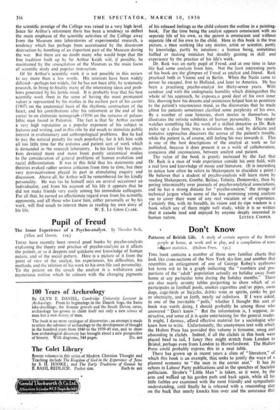Pupil of Freud
The Inner Experience of a Psycho-analyst. By Theodor Reik. (Allen and Unwin. 213.)
THERE have recently been several good books by psycho-analysts explaining the theory and practice of psycho-analysis as it affects the patient, or as it deepens and quickens our knowledge of human nature, and of the social pattern. Here is a picture of it from the point of view of the analyst, his experiences, his difficulties, his methods, and the relation of his work to his own life and personality. To the patient on the couch the analyst is a withdrawn and mysterious outline which he colours with the changing pigments
of his released feelings as the child colours the outline in a painting- book. For The time being the analyst appears omniscient with no separate life of his own, as the parent is omniscient and without separate life of his own to the child. Here in this book is the true picture, a Man working like any doctor, artist or scientist, partly by knowledge, partly by intuition ; a human being, sometimes baffled or making mistakes but steadily gaining in skill and experience by the practice of his life's work.
Dr. Reik was an early pupil of Freud, and at one time in later life had some analysis from him. Not the least interesting parts of his book are the glimpses of Freud as analyst and friend. Reik practised both in Vienna and in Berlin. When the Nazis came to power he escaped, first to Holland, and later to America. He has been a practising psycho-analyst for thirty-seven years. With candour and with the undogmatic humility which distinguishes the whole of his approach, he exposes-a good deal of his own inner life, showing how his dreams and resistances helped him to penetrate to the patient's unconscious mind, as the discoveries that he made abbut his patients sometimes clarified some perplexity of his own. By a number of case histories, short stories in themselves, he illustrates the infinite subtleties of human personality. The reader watches something like the work of a skilled detective as Dr. Reik picks up a clue here, tries a solution there, and by delicate and tentative approaches discovers the source of the patient's trouble, while the patient is, of course, still feeling his way towards it. This is one of the best descriptions of the analyst at work so far published, because it does present it as a work of collaboration, conscious Aid unconscious, between analyst and patient.
The value of the book is greatly increased by the fact that Dr. Reik is a man of wide experience outside his ovin field, with a real love and knowledge of music and literature. (It is interesting to notice how often he refers to Shakespeare to elucidate a point.) He believes that a student of psycho-analysis will learn more by reading Shakespeare, Goethe, Balzac, Tolstoy, Dostoevsky, than by poring interminably over journals of psycho-analytical associations, and he has a strong distaste for " psycho-analese," the strings of technical jargon which some of the less promising young analysts use to cover their want of any real vocation or of experience. Certainly this, with its breadth, its vision and its ripe wisdom is a book which any of them might well study, while it is so written that it can•be read and enjoyed by anyone deeply interested in


































 Previous page
Previous page